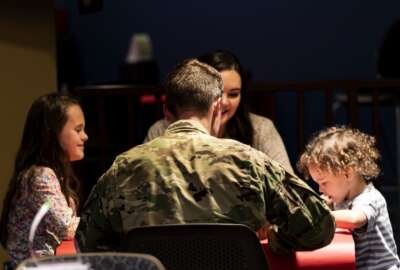
Extended stop move order starting to impact military finances, childcare
More families are paying rent in two places and losing childcare as the coronavirus outbreak continues.
The military is seeing an uptick in issues its families face regarding their quality of life and finances after the Defense Department extended its stop move order until June 30.
Initial problems from the original order, which started in March and was supposed to conclude in May, seemed to dissipate as the military services provided aid and families began to adjust. However, new data from the Blue Star Families Pain Points Survey shows a latent rise in military families paying for housing in two or more places and families losing childcare.
“What we are seeing is an immediate reaction to the stop move order extension,” said Jenny Akin, senior evaluation manager at Blue Star Families. “Families are canceling home purchases, losing earnest money and now they’re moving from Airbnb to Airbnb, which is more than a mortgage. They’re having to pay above their per diem.”
The newest numbers are even starker than the polling originally released at the beginning of the initial stop movement order.
Thirty-two percent of families say they have or will pay for housing in two areas over the next 60 days. That’s up from 20% when the first stop move order was put into effect.
Additionally, 7% of families have been displaced due to delayed permanent changes of station. That’s up from 3% over the last three weeks. That number peaked directly after the first stop move order was announced in mid-March at 10%.
There has also been an increase in the number of families paying unexpected out-of-pocket expenses as a result of rescheduling moves. That number is up to 21% after settling down to 16% from a peak of 27% back in March.
“I think most people are still trying to wrap their heads around what the stop movement really is,” Akin said. You’re seeing notionally people are not able to fully understand how to handle the crisis or they thought it would be over by now.”
Akin said the military talked about extending the stop move order, but didn’t give a hard deadline on when the announcement would come. As a result, families continued with their original PCS place.
“I think there were families who did not anticipate it going all through June, who really did expect to move,” Akin said.
There are also longer-term impacts causing issues. She said the 32% number is likely to come down once issues get sorted out and the Defense Department can signal more stability with policies.
“There are renters defaulting on payments, families delaying putting their home on the market or having a buyer back out,” Akin said.
Childcare woes
Another concerning number popping up in the latest survey is the number of essential employees still operating without childcare. According to the survey, 19% of essential service members and 20% of essential civilians do not have adequate childcare.
“What’s not covered is if one partner is mission essential and the other is not,” Akin said. “Those families in particular are having a very difficult time finding childcare.”
Helen Roadarmel, Army program manager for child, youth and school services, told Federal News Network that the service is providing childcare for 1,900 children with parents who are essential workers.
Throughout the coronavirus crisis, childcare issues have become an increasing problem. About 30% of military families had lost access to their normal childcare provider in March. That has risen to 54%. Some families are forced to continue paying childcare services to retain their spots, especially in civilian run childcare centers.
Copyright © 2025 Federal News Network. All rights reserved. This website is not intended for users located within the European Economic Area.
Scott Maucione is a defense reporter for Federal News Network and reports on human capital, workforce and the Defense Department at-large.
Follow @smaucioneWFED






